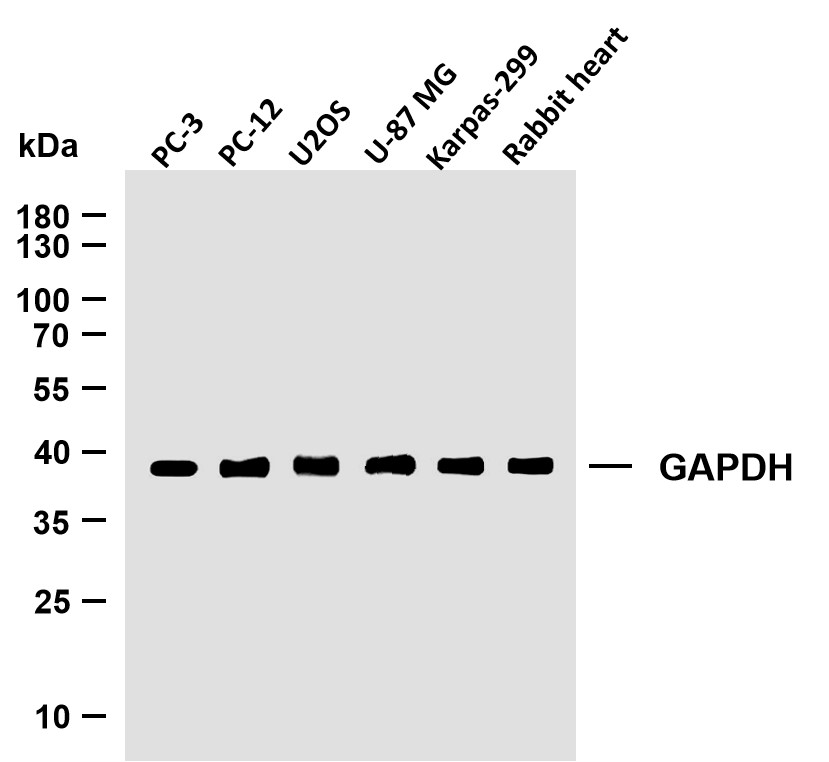
Catalog: YM6074
Size
Price
Status
Qty.
200μL
$600.00
In stock
0
100μL
$340.00
In stock
0
40μL
$190.00
In stock
0
Add to cart


Collected


Collect
Main Information
Target
GST-Pi
Host Species
Mouse
Reactivity
Human, Mouse
Applications
IHC, ELISA
MW
23kD (Calculated)
23kD (Observed)
Conjugate/Modification
Unmodified
Detailed Information
Recommended Dilution Ratio
IHC 1:200-400; ELISA 1:500-5000
Formulation
PBS, 50% glycerol, 0.05% Proclin 300, 0.05%BSA
Specificity
The antibody can specifically recognize human GST-Pi protein.
Purification
The antibody was affinity-purified from ascites by affinity-chromatography using specific immunogen.
Storage
-15°C to -25°C/1 year(Do not lower than -25°C)
MW(Calculated)
23kD
MW(Observed)
23kD
Modification
Unmodified
Clonality
Monoclonal
Clone Number
ABT256
Isotype
IgG2b,Kappa
Related Products
Antigen&Target Information
Immunogen:
Synthesized peptide derived from human GST-Pi AA range: 150-210
show all
Specificity:
The antibody can specifically recognize human GST-Pi protein.
show all
Gene Name:
GSTP1 FAEES3 GST3
show all
Protein Name:
Deafness;Deafness X-linked 7;DFN7;FAEES3;Fatty Acid Ethyl Ester Synthase III;Glutathione S Transferase 3;Glutathione S Transferase Pi;Glutathione S-transferase P;Glutathione S-transferase pi 1;GST class-pi;GST3;GSTP;Gstp1;GSTP1-1;GSTP1_HUMAN;PI;X linked 7
show all
Other Name:
Deafness ;
Deafness X-linked 7 ;
DFN7 ;
FAEES3 ;
Fatty Acid Ethyl Ester Synthase III ;
Glutathione S Transferase 3 ;
Glutathione S Transferase Pi ;
Glutathione S-transferase P ;
Glutathione S-transferase pi 1 ;
GST class-pi ;
GST3 ;
GSTP ;
Gstp1 ;
GSTP1-1 ;
GSTP1_HUMAN ;
PI ;
X linked 7
Deafness X-linked 7 ;
DFN7 ;
FAEES3 ;
Fatty Acid Ethyl Ester Synthase III ;
Glutathione S Transferase 3 ;
Glutathione S Transferase Pi ;
Glutathione S-transferase P ;
Glutathione S-transferase pi 1 ;
GST class-pi ;
GST3 ;
GSTP ;
Gstp1 ;
GSTP1-1 ;
GSTP1_HUMAN ;
PI ;
X linked 7
show all
Background:
Glutathione S-transferases (GSTs) are a family of enzymes that play an important role in detoxification by catalyzing the conjugation of many hydrophobic and electrophilic compounds with reduced glutathione. Based on their biochemical, immunologic, and structural properties, the soluble GSTs are categorized into 4 main classes: alpha, mu, pi, and theta. This GST family member is a polymorphic gene encoding active, functionally different GSTP1 variant proteins that are thought to function in xenobiotic metabolism and play a role in susceptibility to cancer, and other diseases. [provided by RefSeq, Jul 2008],
show all
Function:
Catalytic activity:RX + glutathione = HX + R-S-glutathione.,Function:Conjugation of reduced glutathione to a wide number of exogenous and endogenous hydrophobic electrophiles.,online information:The Singapore human mutation and polymorphism database,similarity:Belongs to the GST superfamily. Pi family.,similarity:Contains 1 GST C-terminal domain.,similarity:Contains 1 GST N-terminal domain.,subunit:Homodimer.,
show all
Cellular Localization:
Cytoplasmic
show all
Tissue Expression:
show all
Research Areas:
>>Glutathione metabolism ;
>>Metabolism of xenobiotics by cytochrome P450 ;
>>Drug metabolism - cytochrome P450 ;
>>Drug metabolism - other enzymes ;
>>Metabolic pathways ;
>>Platinum drug resistance ;
>>Pathways in cancer ;
>>Chemical carcinogenesis - DNA adducts ;
>>Prostate cancer ;
>>Hepatocellular carcinoma ;
>>Fluid shear stress and atherosclerosis
>>Metabolism of xenobiotics by cytochrome P450 ;
>>Drug metabolism - cytochrome P450 ;
>>Drug metabolism - other enzymes ;
>>Metabolic pathways ;
>>Platinum drug resistance ;
>>Pathways in cancer ;
>>Chemical carcinogenesis - DNA adducts ;
>>Prostate cancer ;
>>Hepatocellular carcinoma ;
>>Fluid shear stress and atherosclerosis
show all
Signaling Pathway
Reference Citation({{totalcount}})
Catalog: YM6074
Size
Price
Status
Qty.
200μL
$600.00
In stock
0
100μL
$340.00
In stock
0
40μL
$190.00
In stock
0
Add to cart


Collected


Collect
Recently Viewed Products
Clear allPRODUCTS
CUSTOMIZED
ABOUT US
Toggle night Mode
{{pinfoXq.title || ''}}
Catalog: {{pinfoXq.catalog || ''}}
Filter:
All
{{item.name}}
{{pinfo.title}}
-{{pinfo.catalog}}
Main Information
Target
{{pinfo.target}}
Reactivity
{{pinfo.react}}
Applications
{{pinfo.applicat}}
Conjugate/Modification
{{pinfo.coupling}}/{{pinfo.modific}}
MW (kDa)
{{pinfo.mwcalc}}
Host Species
{{pinfo.hostspec}}
Isotype
{{pinfo.isotype}}
Product {{index}}/{{pcount}}
Prev
Next
{{pvTitle}}
Scroll wheel zooms the picture
{{pvDescr}}



















